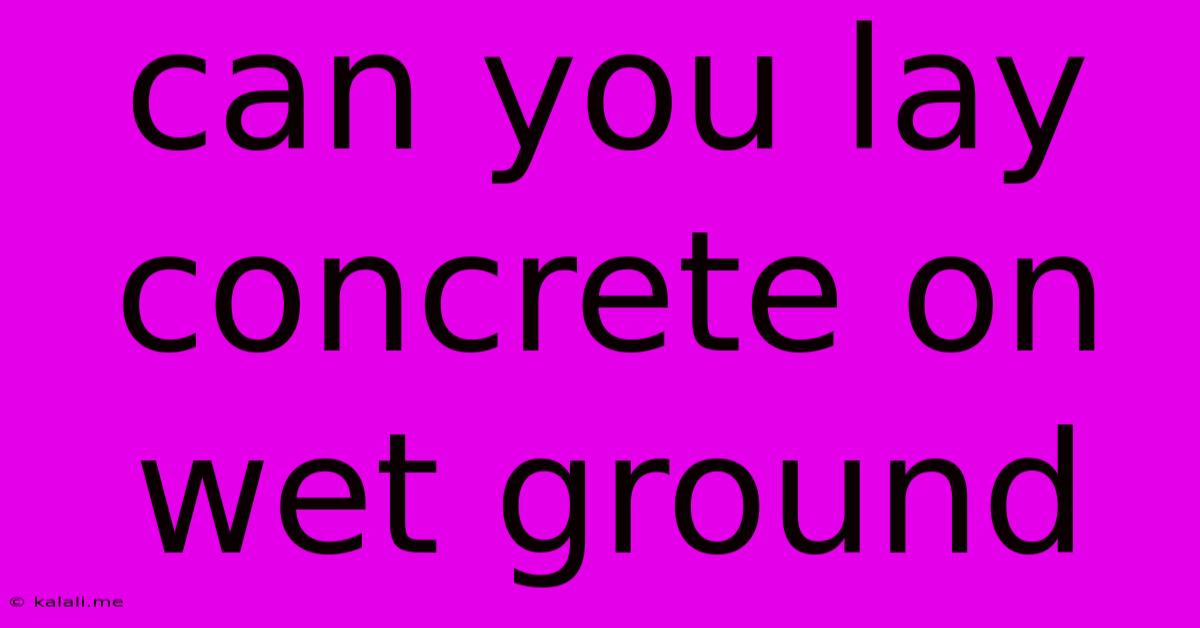Can You Lay Concrete On Wet Ground
Kalali
May 25, 2025 · 3 min read

Table of Contents
Can You Lay Concrete on Wet Ground? The Definitive Guide
Meta Description: Pouring concrete onto wet ground is a common question for DIYers and professionals alike. This guide explores the risks, solutions, and best practices for laying concrete in damp conditions. Learn how to assess your ground, prepare for a successful pour, and avoid costly mistakes.
Laying concrete is a crucial part of many construction projects, from driveways and patios to foundations and retaining walls. However, a common question that often arises, especially for those tackling DIY projects, is whether it's possible to lay concrete on wet ground. The short answer is: generally, no. Pouring concrete directly onto wet soil can lead to a range of problems, from cracking and weakening to complete failure. But let's delve deeper into the complexities and explore the scenarios where it might be feasible, and how to mitigate risks.
Understanding the Risks of Pouring Concrete on Wet Ground
The primary issue with pouring concrete onto wet ground is sub-base instability. Water weakens the soil, making it less capable of supporting the weight of the concrete. This can result in:
- Settlement: The concrete can sink unevenly into the softened ground, leading to cracks and an uneven surface. This is particularly problematic for large pours like driveways or patios.
- Reduced Strength: The moisture in the soil can interfere with the curing process of the concrete, hindering its ability to achieve its full strength. This leads to a weaker, more vulnerable structure.
- Frost Heave: In colder climates, water trapped beneath the concrete can freeze and expand, causing the concrete to heave and crack. This damage can be extensive and costly to repair.
- Void Formation: Water can prevent proper bonding between the concrete and the ground, creating voids that further compromise the structural integrity.
When Might it Be Acceptable (With Extreme Caution)?
There are very limited circumstances where pouring concrete on slightly damp ground might be considered, but this requires careful evaluation and specific preparations:
- Minor Surface Moisture: A small amount of surface moisture that evaporates quickly might not pose a significant risk. However, you should still ensure proper compaction and drainage.
- Well-Drained Soil: If the soil is well-drained and the water isn't pooling, the risk is lower. However, thorough testing is essential.
- Use of a Suitable Base: Employing a robust base layer, such as compacted gravel or crushed stone, can dramatically reduce the risk of problems. This base acts as a drainage layer and provides a stable platform for the concrete.
Best Practices for Laying Concrete in Damp Conditions
If you must work in slightly damp conditions, here are crucial steps to take:
- Thorough Soil Assessment: Evaluate the soil type, drainage properties, and moisture content. If in doubt, consult a professional.
- Drainage Improvement: Implement drainage solutions like ditches or French drains to divert excess water away from the area.
- Proper Compaction: Compress the sub-base thoroughly using a compactor to create a stable and even surface.
- Base Layer: Always use a well-compacted base layer of gravel or crushed stone, at least 4-6 inches thick, to provide support and drainage.
- Concrete Mix Design: Consider using a concrete mix designed for wet conditions or adding admixtures to improve workability and strength.
- Monitoring: Regularly monitor the concrete during the curing process and address any issues promptly.
Conclusion: Prevention is Key
While laying concrete directly on saturated or excessively wet ground is strongly discouraged, careful planning, proper preparation, and adherence to best practices can minimize risks in slightly damp conditions. However, remember that prevention is key. If you're unsure, consult a qualified concrete contractor to ensure your project's success and longevity. The cost of rectifying a poorly laid concrete slab far outweighs the cost of proper preparation.
Latest Posts
Latest Posts
-
The World You Were Born In No Longer Exists
May 25, 2025
-
My Name Is A Killing Word
May 25, 2025
-
Light Switch Has 2 Black Wires And 1 Red
May 25, 2025
-
Filling In Holes In Concrete Floor
May 25, 2025
-
No Mans Sky 1 2 6 24
May 25, 2025
Related Post
Thank you for visiting our website which covers about Can You Lay Concrete On Wet Ground . We hope the information provided has been useful to you. Feel free to contact us if you have any questions or need further assistance. See you next time and don't miss to bookmark.